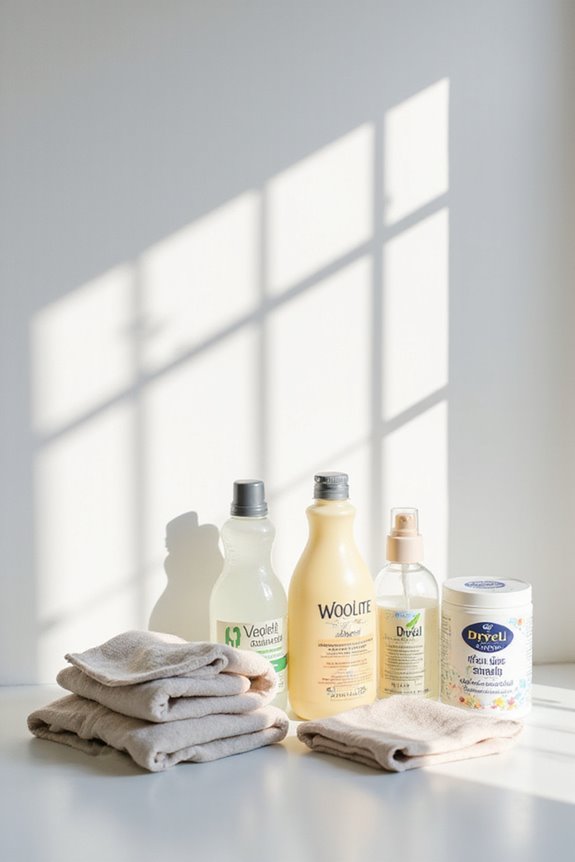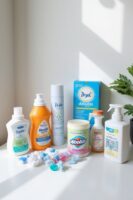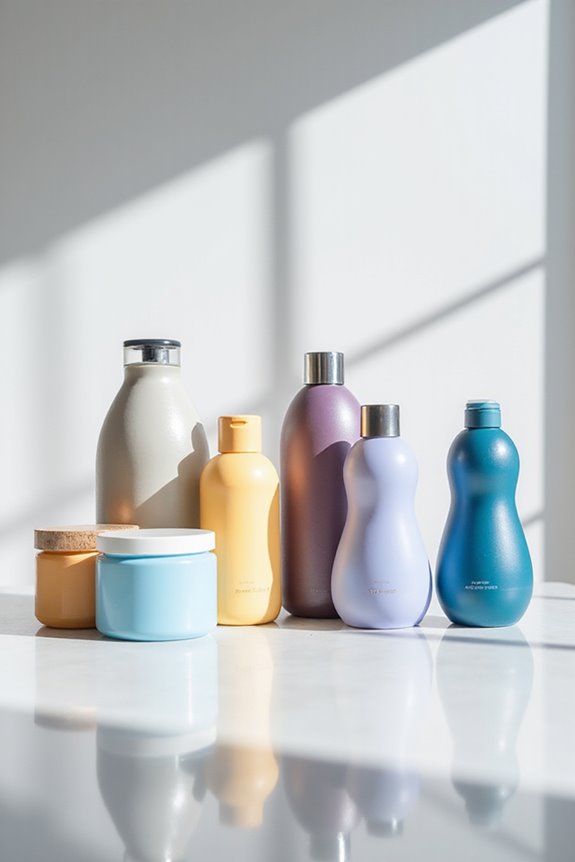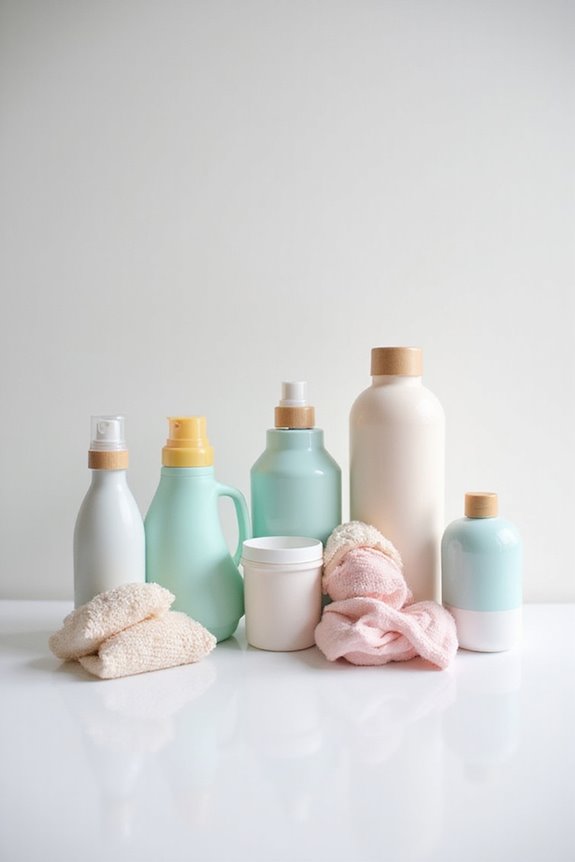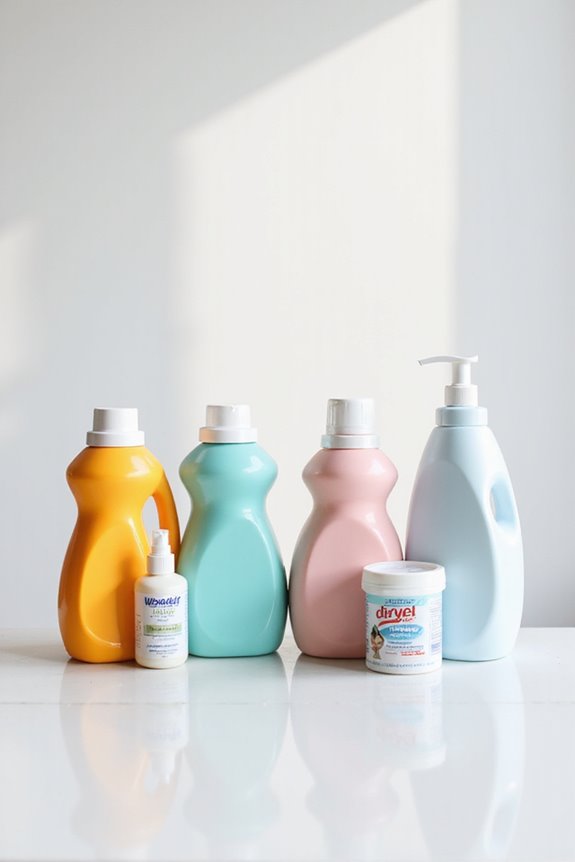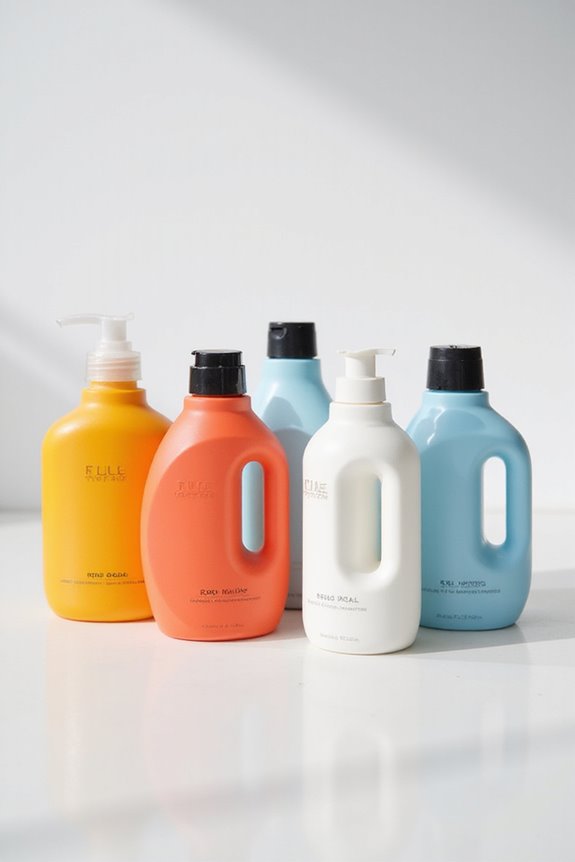We think hypoallergenic laundry detergents are a smart choice for babies. They’re crafted to keep sensitive skin safe, reducing the chances of rashes and irritation. These formulas use gentle, plant-derived ingredients instead of harsh chemicals, making them a win for washing baby clothes. Plus, they effectively tackle stains from baby food without leaving irritating residues behind. So, if you’re curious about which brands work best or how they perform, there’s more good stuff to uncover!
Key Takeaways
- Hypoallergenic laundry detergents reduce the risk of skin irritation for babies with sensitive skin, addressing issues like itching and rashes.
- They contain gentle, plant-derived surfactants and avoid harsh chemicals, making them safer for baby laundry.
- Hypoallergenic detergents effectively remove organic stains, maintaining cleanliness without compromising baby skin safety.
- Many hypoallergenic options are environmentally friendly, using biodegradable ingredients and eco-conscious packaging.
- These detergents are often available at various price points, catering to different budgets while ensuring baby comfort.
Understanding Baby Skin Sensitivity
When we think about our little ones’ skin, it’s hard not to worry. Baby skin is incredibly delicate, and sensitivity factors can make things tricky. Did you know that over half of all children experience some form of sensitive skin? That’s a significant number! Symptoms like itching, rashes, and redness can pop up after exposure to soaps or detergents. We’ve all seen those cute little faces looking uncomfortable, and it’s our job to help. Identifying sensitive skin early is key. It allows us to minimize irritants and protect that fragile barrier. So, let’s keep an eye out for any signs of sensitivity, because our babies deserve the gentlest care possible. After all, happy skin means happy babies! Choosing hypoallergenic formulations can be an effective way to reduce the risk of irritation.
Key Ingredients in Hypoallergenic Detergents
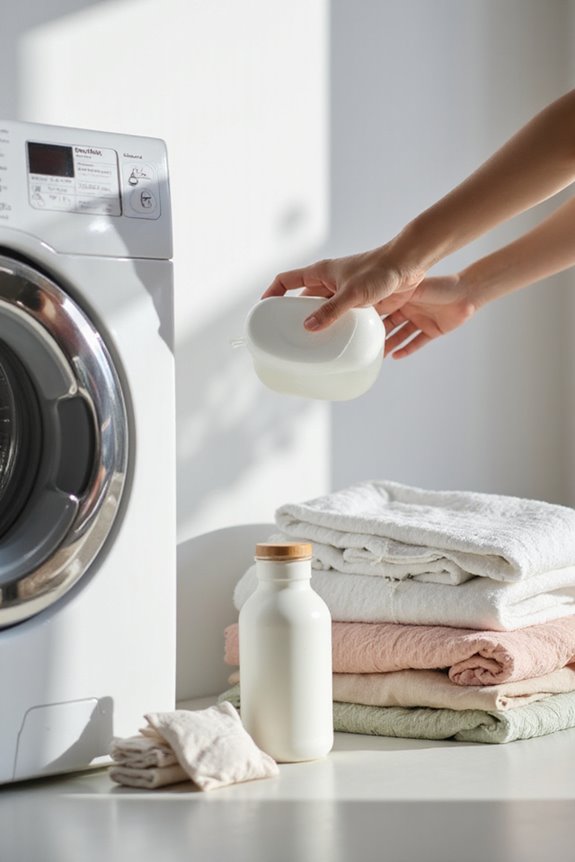
Taking care of our little ones means paying close attention to the products we use, especially when it comes to their laundry. In hypoallergenic detergents, you’ll find gentle surfactant types like sodium coco-sulfate and lauryl glucoside. These plant-derived ingredients clean effectively while minimizing irritation. They’re a far cry from harsh chemicals like sodium lauryl sulfate, which we definitely want to avoid for our babies’ delicate skin.
Many hypoallergenic formulas also include enzyme benefits, utilizing plant-based enzymes like protease and amylase. These little helpers tackle tough stains from spit-up and food without the risk of irritation. By choosing these products, we’re not just ensuring clean clothes; we’re also keeping our babies’ skin safe and happy. That’s a win-win! Additionally, it’s crucial to consider fragrance-free options, as many top brands offer dermatologist-recommended choices to prevent allergic reactions.
Cleaning Effectiveness Compared to Traditional Detergents
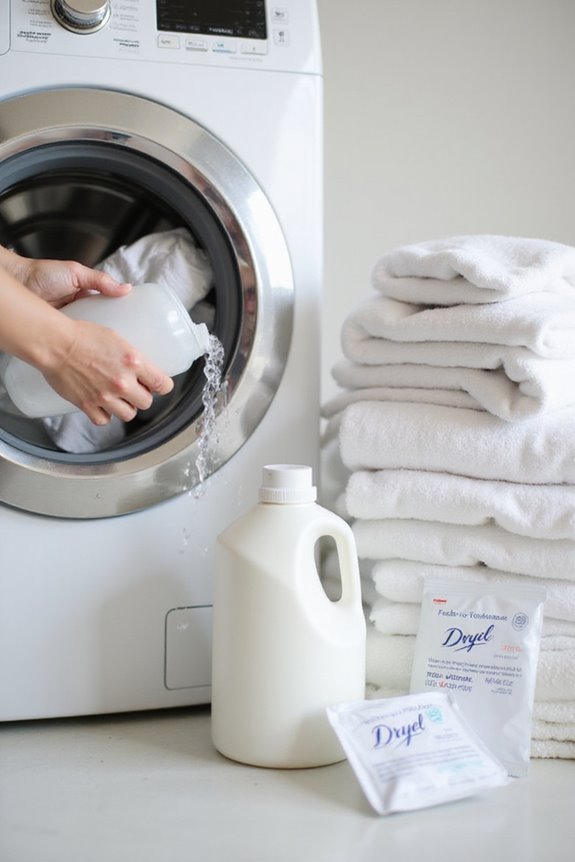
While it might seem like hypoallergenic detergents would struggle to keep up with traditional options, that’s not the case at all. In lab tests, these detergents effectively tackle organic stains like formula and baby food. We’ve found that top-rated hypoallergenic brands, like Babyganics, can match or even surpass some traditional detergents in stain removal. Plus, many parents report that they’re satisfied with the cleaning performance for baby laundry.
Hypoallergenic detergents are designed to clean without harsh chemicals, making them gentle on baby’s skin. They rinse clean, reducing the risk of irritants clinging to fabrics. Many of these products are also free from harmful chemicals, which further enhances their safety for your little one. So, if you’re worried about cleaning power, rest assured—these options can keep your little one’s clothes fresh and clean!
Environmental Impact of Hypoallergenic Options
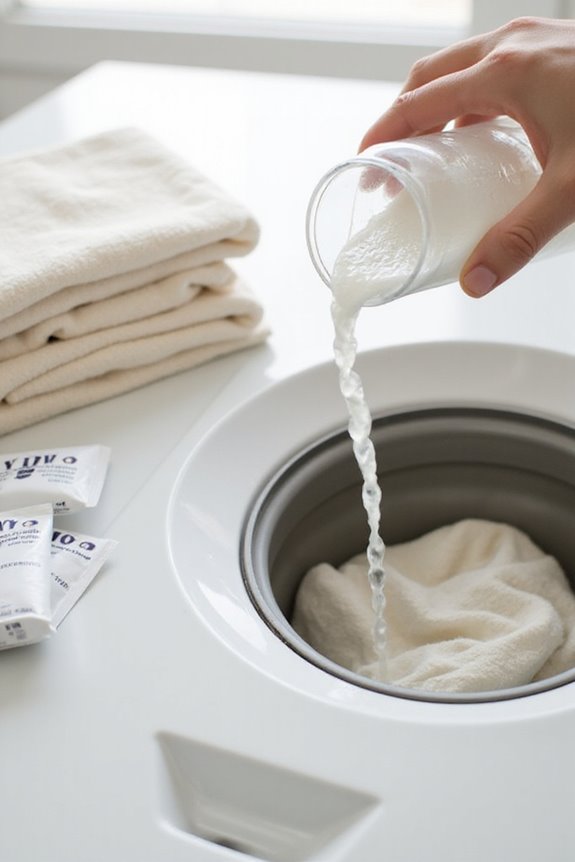
As we explore the environmental impact of hypoallergenic laundry detergents, it’s clear that they offer a greener alternative to traditional options. These detergents often skip harsh chemicals and phosphates, which helps keep our waterways clean. By choosing hypoallergenic products, we’re making sustainable choices that promote healthier aquatic ecosystems.
Their biodegradable ingredients break down faster, reducing toxic buildup in rivers and lakes. Plus, without synthetic fragrances or heavy metals, we’re protecting fish and other aquatic life. And let’s be honest, nobody wants to harm our fishy friends!
With eco-friendly packaging and lower carbon footprints, hypoallergenic detergents not only benefit our babies but also contribute to a healthier planet. Moreover, many of these detergents are made with plant-based ingredients, further enhancing their eco-friendly profile. So, why not make the switch?
Cost and Availability of Hypoallergenic Detergents
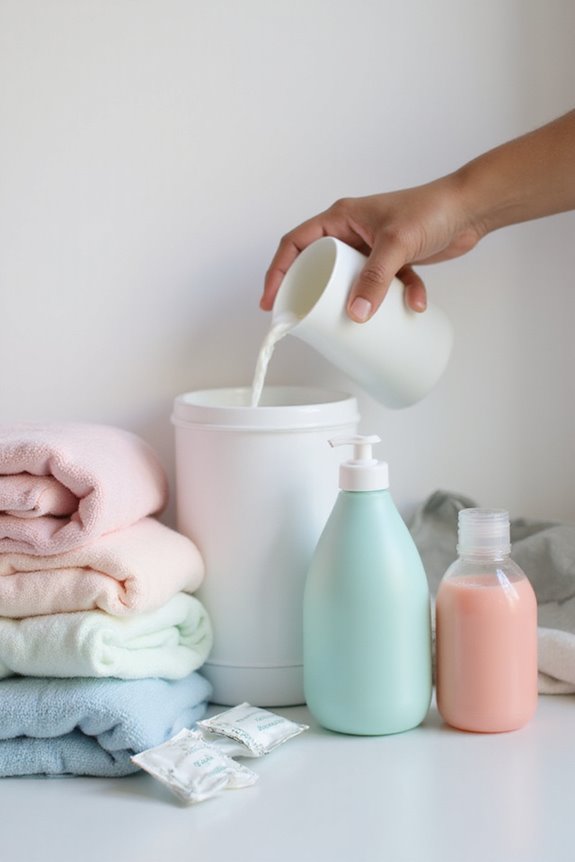
Choosing hypoallergenic laundry detergents not only benefits our planet but also affects our wallets. When we look at price comparison, some options, like Puracy starter kits, are around $20, while refill pouches can hit $36. On the budget side, HeySunday sheets are about $15 for 60 sheets, making them quite competitive. We’ve found that liquid detergents like Arm & Hammer offer 105 ounces for around $10, which is a steal at about $0.10 per load. However, product accessibility varies. While Puracy is widely available online and in stores, HeySunday is only found on their website. So, if we’re in a pinch, knowing where to find these products can save us time—and money! Additionally, many of these options are designed to be hypoallergenic and biodegradable, making them suitable for those with sensitive skin.
Considerations for Parents When Choosing Detergents
When it comes to picking the right laundry detergent for our little ones, we’ve got to think carefully about a few key factors. First, let’s look at product certifications. We want detergents that meet safety standards—like EPA Safer Choice certification—ensuring they’re gentle on baby skin. Next, ingredient transparency is essential. We should read labels to avoid harsh chemicals, dyes, and fragrances that can irritate our baby’s delicate skin. If we notice any signs of irritation, it might be time to switch to hypoallergenic options. Additionally, many fragrance-free detergents are specifically designed to minimize skin reactions, making them ideal for sensitive skin types. Finally, keeping an eye on how our baby reacts post-laundry helps us fine-tune our choices. After all, our little ones deserve the best, and we’re their first line of defense!
Frequently Asked Questions
Can Hypoallergenic Detergents Prevent All Skin Reactions in Babies?
While hypoallergenic detergents help minimize skin reactions, they can’t prevent all issues due to individual skin sensitivity factors and common allergens. We should always monitor our babies for any signs of irritation.
How Often Should I Wash Baby Clothes With Hypoallergenic Detergent?
We should wash baby clothes frequently, ideally after each use, to maintain hygiene and maximize detergent effectiveness. This helps remove irritants and guarantees our little ones’ sensitive skin stays safe and comfortable.
Are There Any Specific Brands Recommended for Sensitive Baby Skin?
When we think of baby detergent recommendations, it’s like choosing a gentle hug for our little ones. Brands like Dreft, Molly’s Suds, and Babyganics cater specifically to sensitive skin, ensuring comfort and safety during every wash.
Can I Use Hypoallergenic Detergent for My Entire Family’s Laundry?
Yes, we can definitely use hypoallergenic detergent for our entire family’s laundry. Its gentle formula helps reduce skin irritation, making it a safe and practical choice for everyone, simplifying our detergent selection while ensuring effective cleaning.
What Should I Do if My Baby Still Experiences Irritation?
If our baby still experiences irritation, we shouldn’t panic. Let’s explore skin sensitivity solutions together, considering alternative laundry options. Consulting a pediatrician may also guide us in finding the right products for our little one.

